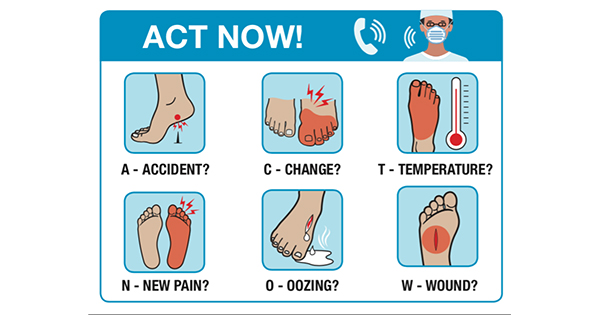FDUK continues to develop and contribute across a range of areas. It remains a strong influencer and has seats on a wide range of strategic groups who develop and recommend policy, including: Diabetes UK health professional group, the All-party Parliamentary Limb Loss Group and vascular groups, the College of Podiatry Directorate of podiatric medicine, and the Putting Feet First group, among others. It has been active educationally, providing the conference tracks for the College of Podiatry annual conference and the Diabetes UK annual conference. This is in addition to the increasingly successful FDUK conference, which had its biggest attendance ever last year, while this year’s conference is fast approaching (November 15, Harrogate International Centre). The group also provided the educational input for the new diabetes foot screening app to be launched by the College of Podiatry and the Royal College of Nursing.
Within the national arena, we have contributed to the development of the NICE quality standards and have also been at the forefront of developing the surgical pathway for ulceration, in conjunction with other key stakeholders. FDUK continues to drive the vascular agenda following the signing of the memorandum of understanding between the College of Podiatry and the Vascular Society. Internally, the committee has been developing a new constitution to try and ensure that, as the group grows and evolves, there is a robust system of governance to ensure its continued success. This will hopefully be launched at this year’s FDUK conference in Harrogate. Another new initiative is the development of the FDUK Award, which is designed to identify and celebrate up-and-coming practitioners in the field of diabetic foot management. FDUK is active across the whole of the United Kingdom and has maintained strong links in these areas; the three leads from the other nations will now describe the activity in their area.
Northern Ireland (Jill Cundell)
The Department of Health in Northern Ireland has produced a document — ‘The Diabetes Strategic Framework’ — which sets out a new model of care that is partnership based and which promotes an innovative approach as to how diabetes services are planned and delivered to maximise health outcomes and minimise the risk of developing complications. It also promotes a public health approach to primary prevention of type 2 diabetes, which is aligned to the Department’s ‘Making Life Better’ Strategic Framework for Public Health and ‘A Fitter Future for All’ — the obesity prevention framework. The public consultation on this document closed in May 2016 and an implementation strategy, which will include diabetic foot care as a priority, will follow.
A group for clinicians with an interest in the diabetic foot has developed an integrated diabetic foot care pathway that will include the development of foot protection and structured multidisciplinary foot teams in each Trust in Northern Ireland. A regional diabetic foot service will be delivered in Belfast, where the vascular surgical services are currently based.
The podiatry managers group in Northern Ireland (FOMNIG) applied for, and successfully obtained, funding from GAIN (Guidelines and Audit Implementation Network) to carry out a baseline regional audit of diabetes foot services. The audit is complete and results will be published in the near future.
Sadly, Bernard Lee, consultant vascular surgeon with an interest in diabetic foot disease, retired in December 2015.
Scotland (Duncan Stang)
It has been another busy year for the Scottish Diabetes Foot Action Group (SDFAG) with various work streams being delivered or in development.
The 2016 update of our Diabetic Foot Risk Stratification and Triage ‘Traffic Light’ system was launched at the Scottish Diabetic Foot conference in Glasgow in June.
The updated system focuses more on preventative measures for ‘at risk’ patients in an effort to try and prevent foot ulceration, rather than just providing treatment when it does occur.
New laminated posters of the Traffic Light System are currently being distributed Scotland-wide and a service specification document is being produced to guide health boards on how to implement the necessary changes to their service provision in line with the changes in to the Traffic Light system.
The new inpatient campaign CPR for diabetic feet is being rolled out across Scotland. This campaign is to ensure all patients with diabetes admitted to hospital have their feet: Checked on admission, if they are at risk of developing an avoidable foot/heel ulcer they are Protected, and if they have an existing ulcer, they are Referred appropriately.
This is proving to be a greater task than initially anticipated, but is gaining traction.
The online diabetic foot screening tool on the SCI-Diabetes system is being updated to reflect the changes to the Traffic Light system, most importantly, the addition of kidney disease (eGFR≤15) as a risk factor and the inclusion of the ‘In Remission’ group.
The SCI-Diabetes Ulcer Management System has been updated and is currently undergoing user testing. The new system is proving to be much more efficient in supporting clinicians to deliver quality standardised care with the ability to share this information with whoever is involved in the patients care. A pilot is currently under way to enable the system to store foot images effectively and securely to improve the facility of monitoring progression/deterioration, especially when a shared care model is in place.
Wales (Ros Thomas)
Wales is hopefully piloting their our own version of Sky DC by the end of October this year; a clinical portal by which all clinicians in Wales can share information regarding diabetes, both in primary and secondary care.
Scott Cawley has been appointed podiatry lead for feet in Wales — he was also appointed as a diabetes clinical champion last year for Diabetes UK. This year, I have also been appointed as a diabetes clinical champion.
We have designed an in-patient daily foot check form, which has been piloted on one of the wards in Morriston Hospital, Swansea, and once it has been audited we hope to share with all health boards in Wales. Together with an app called ‘Pocket Medic’, it is an e-digital health tool whereby you can prescribe a DVD for a patient. These DVDs are films of real patients who give an insight on their journey living with diabetes, and how they have dealt with their condition. Some films are foot-related, focusing on Charcot, amputation and foot ulcers, as well as other diabetes-related lifestyle issues.
The future
The launch of the FDUK constitution should allow further direction for the group and election of new blood on to the committee. Financially, the group is secure, having developed a memorandum of understanding with Omnimed Ltd to support the committee. We are looking forward to hosting our first AGM, where all members can attend, and continuing to be the largest multidisciplinary voice for people with diabetic foot disease and who work in this arena in the UK.





